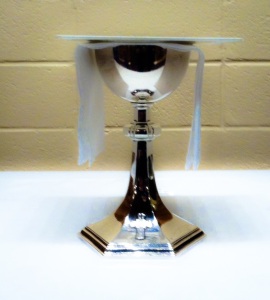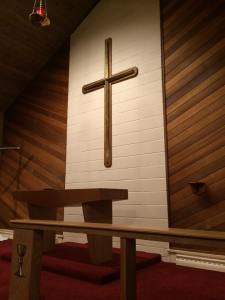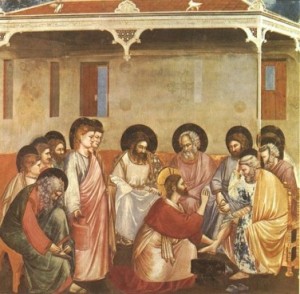Thursday in Holy Week (the week preceding Easter) is the beginning of what is referred to as the Triduum (three days). The Triduum remembers the events of of Thursday, Friday and Saturday, culminating in the great celebration of Easter – Jesus’ resurrection from the dead. Each day of the Triduum has its own special focus and meanings, but while there are three services of the Triduum, they are really considered part of a whole – one continuous worship that takes us from betrayal to resurrection.
The first day of the Triduum is Maundy Thursday, or Holy Thursday. The word “Maundy” is derived from the Latin word “mandatum,” meaning “commandment,” referring to one of the main themes of the day – Jesus’ new commandment for us to love one another. On this day we focus on three main themes: the gift of the Eucharist (Holy Communion), foot washing, and Jesus’ betrayal.
 On Maundy Thursday Jesus celebrated the Passover with his disciples. The connection with Passover is profound. In the Passover, Jews remember how God “passed over” the plague of the death of the first born while they were slaves in Egypt – using the blood of a sacrificed lamb as a sign to save them. When Jesus celebrated the Passover with his disciples, he took bread and gave thanks, and told them that the bread was his body, given for them. Then he took a cup of wine, gave thanks, and told them that cup was the “new covenant” in his blood, shed for them for the forgiveness of sin. Jesus becomes the lamb sacrificed, to save us from the plague of death – the Lamb of God who takes away the sin of the world.
On Maundy Thursday Jesus celebrated the Passover with his disciples. The connection with Passover is profound. In the Passover, Jews remember how God “passed over” the plague of the death of the first born while they were slaves in Egypt – using the blood of a sacrificed lamb as a sign to save them. When Jesus celebrated the Passover with his disciples, he took bread and gave thanks, and told them that the bread was his body, given for them. Then he took a cup of wine, gave thanks, and told them that cup was the “new covenant” in his blood, shed for them for the forgiveness of sin. Jesus becomes the lamb sacrificed, to save us from the plague of death – the Lamb of God who takes away the sin of the world.
On this night Jesus did something truly surprising and offensive to the disciples. In Jesus’ time feet were filthy things. A dusty dry climate and a sandal wearing society meant feet were not pretty. To wash ones feet was a dirty job, and to wash someone else’s feet was truly demeaning. During this night, Jesus took a towel and began to wash the disciples’ feet! Peter, especially, protested. This was NOT something their master should be doing! But Jesus said he was doing it to be an example to them of how they should serve one another. If the master does this for the servants, how much more should the servants do this for one another! Jesus goes so far as to chastise Peter, saying, if you DON’T do this you have no share in the kingdom (John 13:8). This is when Jesus gives us the new commandment to love one another (John 13:34-35). Love in action. Love as a verb.
 Maundy Thursday ends with Jesus’ betrayal and arrest. Jesus, who was given such honor by the people, is stripped, literally and figuratively. He is arrested and brought before the religious authorities who were threatened by his power. He commits the ultimate blasphemy by speaking God’s unspeakable name – in English translated as “I am.” God’s name is SO holy it is never to be spoken, this is why the chief priest rips his clothing as a sign of utter grief and offense. As Jesus was stripped in that time and place, WE strip the altar of our churches. The altar is one of the places we focus our attention during worship. We want our altars to be places of beauty and honor and significance, worthy of our attention to prayer and the Sacrament we celebrate there. But on Maundy Thursday the space becomes bare. The whole chancel (altar area) is “undone” just as Jesus is undone.
Maundy Thursday ends with Jesus’ betrayal and arrest. Jesus, who was given such honor by the people, is stripped, literally and figuratively. He is arrested and brought before the religious authorities who were threatened by his power. He commits the ultimate blasphemy by speaking God’s unspeakable name – in English translated as “I am.” God’s name is SO holy it is never to be spoken, this is why the chief priest rips his clothing as a sign of utter grief and offense. As Jesus was stripped in that time and place, WE strip the altar of our churches. The altar is one of the places we focus our attention during worship. We want our altars to be places of beauty and honor and significance, worthy of our attention to prayer and the Sacrament we celebrate there. But on Maundy Thursday the space becomes bare. The whole chancel (altar area) is “undone” just as Jesus is undone.
It’s a lot to go through in one evening. The events of the three days start fast and furious. To give us time to let it all sink in, the worship ends in silence. No parting prayer, no benediction, no hymn. There is nothing that tells people that worship is over – partly because it’s NOT. As I said at the beginning, the three services of the Triduum are really part of one continuous worship – a watching that has begun on Thursday and will not end until we hear and proclaim “He is risen!” on Sunday morning.
